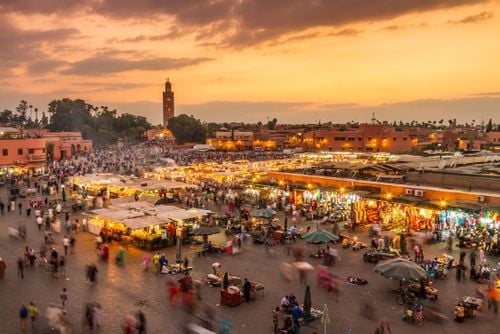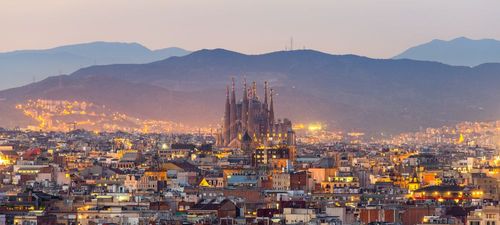The land of the pharaohs
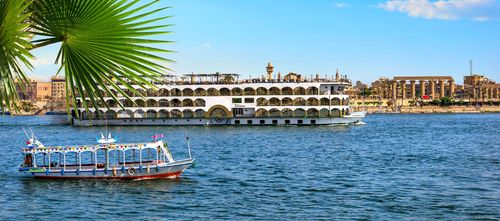
The Luxor riverbank as seen from the Nile.
- © Olha Solodenko / 123RF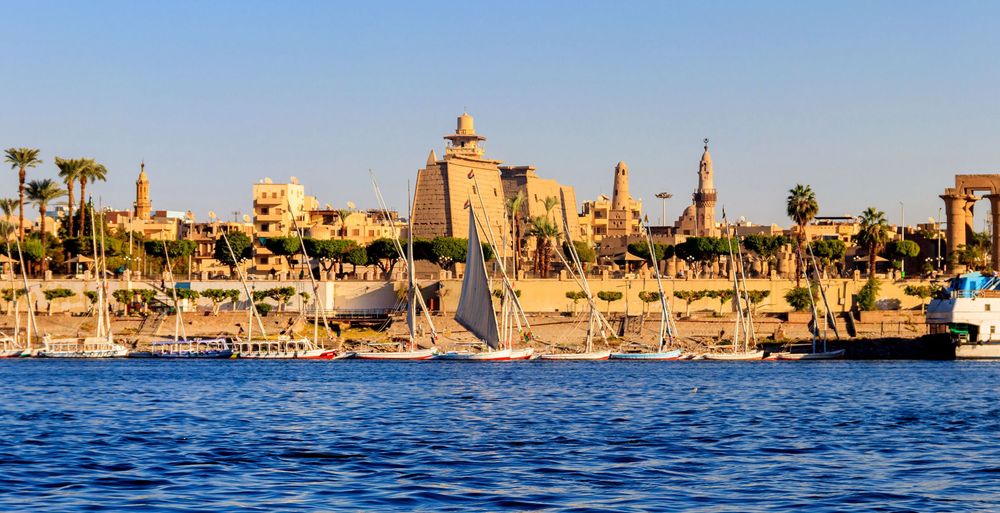
The land of the pharaohs
Egypt is the ancient land of the pharaohs.
What is probably less clear to you, however, is that the pharaonic sites that can be seen today are mostly located along the Nile, mainly downstream from Luxor. Temples on the east bank, necropolises on the west bank.
While the Nile forms a vein of green in the desert that surrounds it as far as Kom Ombo, Luxor lies 600 km south of Cairo (and therefore roughly from the Nile delta leading to the Mediterranean) and 225 km north ofAswan, i.e. Lake Nasser, which lies on the course of the giant river.

Ramses II sits quietly in Luxor's Temple of Amun.
- © 123superstar / 123RFLuxor, the ancient city known as Thebes in our history books, is home to the remarkable sites of its necropolis on the west bank, including the Valley of the Kings, the Valley of the Queens and the funerary temple of Queen Hatshepsut, as well as the Colossi of Memnon, the Ramesseum, the Temple of Millions of Years of Ramses II, the Valley of the Nobles, the Valley of the Monkeys and the Valley of the Artists. On the east bank, the temples of Karnak and Amun stand almost in the heart of the city, on the banks of the river and therefore easier to access.
Along with the pyramids of Giza, on the outskirts of Cairo, they are the most visited sites in the country. There are also some lesser-known sites, such as the 145 tombs of Sheikh Abd el-Gournah, which confirm the exceptional nature of this place.

Mourners at a funeral, shadow of the ancient Egyptian Vizier Ramose, Sheikh Abd el-Qurna necropolis.
- © BasPhoto / ShutterstockHeading down the Nile, some sixty kilometres from Luxor, Esna and its temple of Khnum await you. Then, further south, once you enter the Governorate of Aswan, Edfu and its temple of Horus. 60 kilometres further south is the temple of Sobek and Haroëris at Kom Ombo, one of the best preserved in the world. Still further south, Aswan and its mythical palace, the Cataract Hotel, and the Elephantine Islands. Then further down, Lake Nasser, which stretches as far as the eye can see in the bed of the Nile, leading to the majestic site ofAbu Simbel.
These discoveries can be made in the manner of a rosary as you sail along the Nile at the pace of a cruise. From Luxor, there are as many boats as there are hotels. So there you have it, all the information you need on what Luxor and the surrounding region has to offer in terms of Egyptological interest. Of course, your interest in these priceless sites can only be satisfied if you are interested in the history of ancient Egyptian civilisation, now totally extinct.
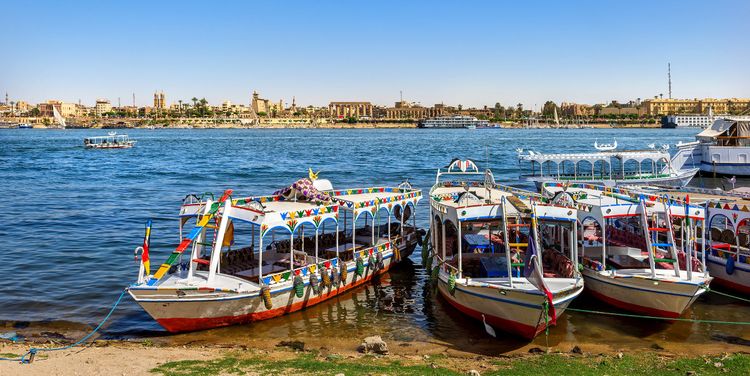
You will only be fully satisfied if you take an interest in their mythology and the significance of the personification of their gods, the rituals to which their kings were subjected as they became gods, in other words pharaohs, in the secret alcoves of their tombs, their dedicated temples or their pyramids. And to their language, transcribed in signs that remained mysterious for centuries, the hieroglyphs.
It all began around 2,000 BC (Middle Kingdom) with the Mentuhotep dynasty, who elevated the god Amun to the rank of national god and made Thebes the royal residence and burial place of the pharaohs.
Today, the town has developed considerably. The hotel infrastructure is varied and generally very good. Obviously a very touristy town, Luxor is well equipped with banks, ATMs (not always in service), shops (particularly quality jewellery) and numerous restaurants. Its more traditional souk is full of inexpensive souvenir gifts.
Taxis and horse-drawn carriages fight it out on the pavement, while felucca boats are the masters of river cruising: as soon as tourists set foot outside, they are immediately boarded! This commercial insistence is friendly, but will come as a surprise to Westerners. However, the natural kindness of the Nile people is no legend.

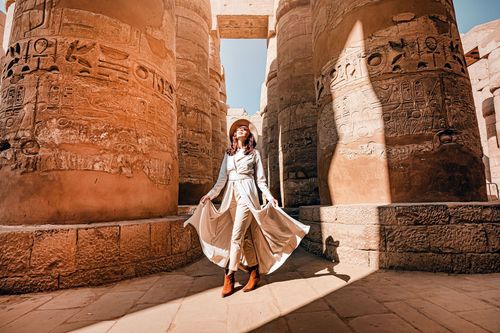
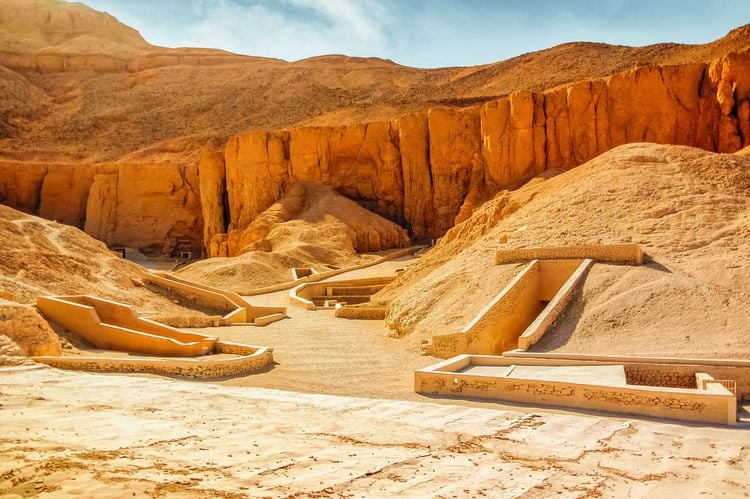 1
1
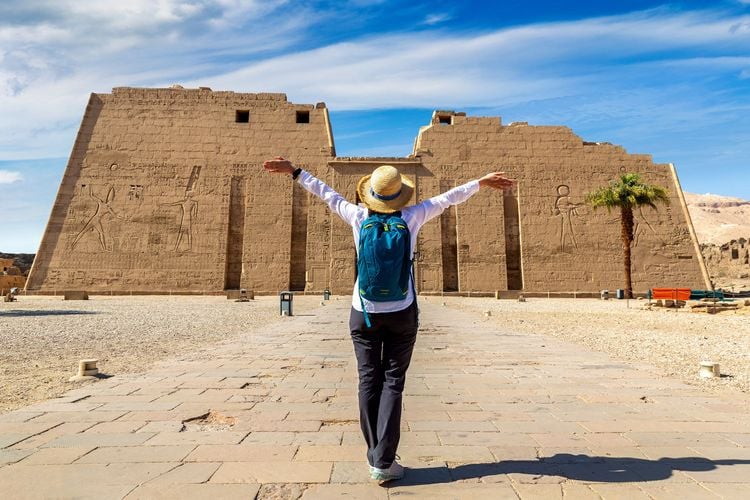 2
2
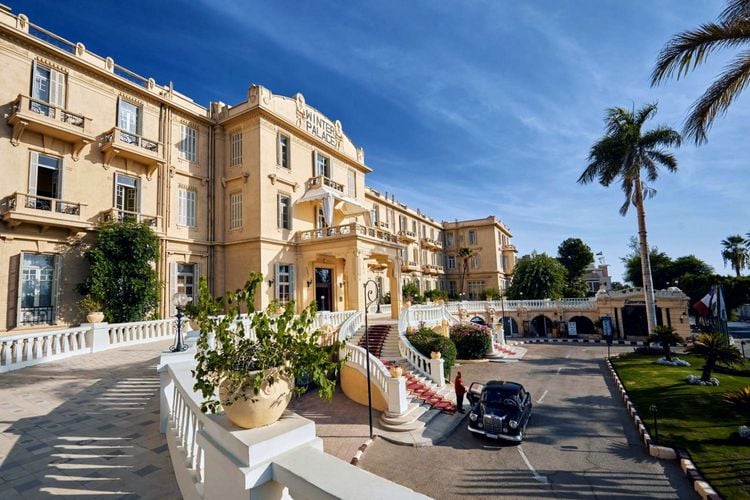 3
3
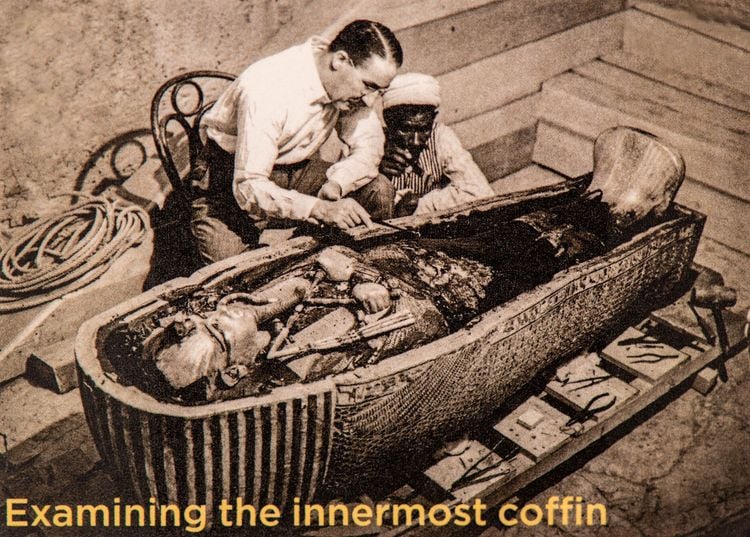 4
4
Egypt's leading tourist region is directly accessible. The average journey time from Paris is 7.5 hours.Luxor international airport is just 6 kilometres from the city and its hotels, where you can arrive directly and without diversions on the road, which is little or not at all congested.
In recent years, the hotel industry in Luxor has expanded considerably. So you'll have no trouble booking a hotel here. A number of them have a swimming pool, which is very pleasant before or after a hot day. If you've opted for a cruise, then of course you'll be staying on the water, which is a practical way of discovering all the sites, most of which lie along the Nile. The Winter Palace, with its pure Victorian colonial style, is in the heart of Luxor, on the east bank of the river. A must, just a stone's throw from the temples of Karnak and Luxor.
There are a variety of means of transport for your visits and outings: taxis, tuk-tuk, bicycles, horse-drawn carriages, camels and even horses! There are also feluccas, barges and cruise boats. And the ferry (to change banks).
To gain entry to the sites, the Egyptian Ministry of Tourism has introduced a number of practical passes:
The Luxor Premium Pass gives you unlimited access to all the sites, including museums, the tombs of Seti I and Nefertari, for 5 days for €180 per person.
The Luxor Standard Pass gives you access to all sites (except the tombs mentioned above), including museums, for 5 days for €90 per person.
The Luxor Pass including the tombs costs $100 per person. It is valid for 5 days.
You can buy them at the Valley of the Kings ticket office, at Karnak Temple and at the Luxor Inspection Public Relations Office (open from 9am to 3pm every day). This office is behind the Luxor Museum.
Please note that you can't buy them online, and you won't be able to pay for them on the spot by credit card, only in cash, dollars or euros.
You will also need to provide a passport photo and a copy of the page of your passport containing your civil status details.
Please note: visits to each tomb are limited in number, generally to 150 people per day. So it's best to be among the first to arrive, in other words, early.
First of all, one thing you should know: there are two rather nasty parasites in Luxor and around the Nile in general that you'd be better off not contracting: the Nile fluke (liver fluke) and bilharzia.
The fluke is a widespread parasite that nests in stagnant water in and around the Nile. As larvae, they settle in and feed on our organs, then grow to the size of a finger.
Nile fluke larvae are common in watercress beds, which are contaminated by sewage. Do not eat watercress - often used to decorate starters or dishes - or raw vegetables (salad, tomatoes, etc.).
Bilharzia is a less serious and treatable parasite, but still very disabling. This parasite enters through the skin. Wear closed shoes and avoid stagnant water or crops.
For reasons of microbial contamination this time, do not drink tap water. If you buy bottled water, make sure it is properly sealed (and not recapped). The Lifestraw process is said to be 99.99% safe and is accredited by the World Health Organisation.
Alternatively, ask your pharmacist about the best method for purifying your water.
There are no compulsory vaccinations for travelling to Egypt. However, it is very advisable to check that your vaccinations are up to date and to get vaccinated against hepatitis A and B, and even typhoid.
Finally, don't touch any mammals, as they can carry rabies, as is the case throughout the Middle East and neighbouring North Africa. If you are with children and stray animals (dogs, cats, etc.) turn up, give your children a hug. A simple lick on the mouth is contaminating.
You will need to obtain a tourist visa and check that your passport is valid for at least 6 months from the date of your arrival on Egyptian soil. You will also be asked for a copy of your plane ticket, or a travel certificate.
As with any trip, make sure you have sufficient means of payment for your stay: cash, traveller's cheques and credit cards.
Check with your bank to find out the maximum amount of cash you can withdraw with your credit card, which is generally subject to a ceiling.
As you will see in our article, there are some activities that you will not be able to pay for in Egyptian pounds, or by credit card, but only in cash, euros or dollars, such as buying a pass to access the sites. Find out more.
To avoid any problems if your credit card is lost or stolen, make sure you have the emergency number to contact before you leave, so that you can cancel your card.
We advise you to travel to Luxor, and more generally on the Nile, during our winter, and more specifically between November and April. During the summer, the heat is such that it becomes a handicap, the air seems to run out.
As the risk of terrorist attack remains high, French tourists are advised to be as vigilant as possible. Stay away from all crowds and/or gatherings. Take care when travelling. Ask your travel agent about the measures and any restrictions imposed by the Egyptian authorities.
Do not leave the beaten track or the main roads, as the risk of mines is high in desert areas. Although crossed by the Nile, Luxor is in the middle of the desert.
Finally, in the event of a serious problem, you can contact the emergency line of the Crisis and Support Centre on +33 1.53.59.11.00 (toll-free).
Women are strongly advised to wear clothing that covers the arms and legs at least below the knees in public places.
Alcohol consumption is restricted to your hotel and any tourist restaurants you may frequent.
Outward displays of intimacy or affection are considered contrary to public decency.
The pantheon of Egyptian gods is immortalised in the form of alabaster, basalt or soapstone statuettes and... resin imitations sold at temple entrances (3 to 6 euros each). You'll also find beautiful cotton fabrics: damask tablecloths and 12 napkins (14 euros); T-shirts (5 euros); chèches (1.50 to 3 euros). To be sure of bringing home a real papyrus, visit Dr Ragab's institutes. Buy jewellery in silver and gold (cheap), turquoise and lapis lazuli and the essential cartouche with your name engraved in hieroglyphics.
👉 In places where you are offered fruit cocktails, syrups, etc., we advise you to politely decline the invitation, as these may be made with undrinkable tap water. Don't eat raw vegetables or fruit, for the same reasons (they'll probably be rinsed in tap water) and also because parasites may be stuck to them.
👉 Put your valuables, passports and return tickets in your room safe. Choose hotels that offer this service.
explore Try out our comparators
It is Easy to travel
